| |
|
 |
 |

|
NL E N G |
Siena | Basilica San Clemente in Santa Maria dei Servi [1]
|
|
![Toacana ] Galleria di immagini](/titels/albump.gif) |
|
| |
 |
|
|
| |
|
Siena | Basilica San Clemente in Santa Maria dei Servi
|
|
|
|
| |
|
The basilica of Santa Maria dei Servi, whose full name is San Clemente in Santa Maria dei Servi is located in Piazza Manzoni, on the hill overlooking Valdimontone.
Santa Maria dei Servi is a Romanesque Church in the Terzo of San Martino.
History
The church is built on the site of the former Church of San Clement, which was acquired by the Servite order in the Medieval era. The original Basilica was built in the 13th century, but later underwent reconstruction and transformation which continued until the 15th-16th century.[3]
Exterior
The façade is simple and unadorned, with a single doorway and a rose window (indications of another can be discerned on the wall). It is in the Romanesque period style.
The adjoining Campanile is likewise of the 13th century, richly embellished by four orders of windows. It was entirely restored in the 20th century. The church building stands atop it is cook entrance stairs, with views over the Duomo and the Palazzo Publico of Siena.[3]
|
|
|
|
| |
|
|
Mappa La basilica di San Clemente in Santa Maria dei Servi, Siena | Enlarge map
|
Interior
The interior is in great contrast with the rough and bare aspect of the exterior. A renaissance design is attributed to Baldassare Peruzzi. The church was enlarged in the fourteenth or fifteenth century, as seen in the interior of a Latin cross, where the Gothic style of the transept and apse joins the Renaissance style of the three aisles. The Renaissance style does not continue into the transept and apse, which are in the Gothic style. Near the entrance is a Crucifix of the 14th century and a Holy Water stoup of the 13th century.[3]
|
 |
Basilica San Clemente in Santa Maria dei Servi, interno [2]
|
Works of art
The most important works housed in the Santa Maria dei Servi include :
Coronation of the Virgin altarpiece
Coronation of the Virgin by Bernardino Fungai. This altarpiece is generally acclaimed as the masterpiece of Fungai and belongs to the period between 1498 and 1501. The four predella panels depicting the life of Saint Clement were sold separately, and were temporarily reunited for an exhibition at the Metropolitan Museum of Art in New York in 1988. The narrative scenes of the four panels are all painted with tempera on wood.
Conversion of Saint Clement, housed in the Musee des Beaux-Arts, Strasbourg. The first panel represents the young philosopher, Clement, who having thought that his parents and two brothers were lost at sea turned more seriously to inquire into the question of the immortality of the soul.
Reunion of Saint Clement with his family, also housed in the Musee des Beaux-Arts, Strasbourg. the second panel shows Clement reunited with his parents and brothers through the instrumentality of Saint Peter the Apostle
Saint Clement Striking the Rock, housed in the City Art Gallery, York, England. The third panel continues the narrative of the life of Saint Clement, after he succeeded Saint Peter as Bishop of Rome.
Martyrdom of Saint Clement, also housed in the City Art Gallery, York, England. The final scene depicting highlights in the life of Clement done in tempera and gold on wood, and is noted as the most magically evocative in Fungai’s career.
The central panel belonging to the predella, depicting The Dead Christ Supported by Two Angels, resurfaced at the 1991 sale of works from the Ferdinand and Imelda Marcos collection at Christie's in New York. The picture was subsequently purchased by the City Art Gallery, York. [4]
|
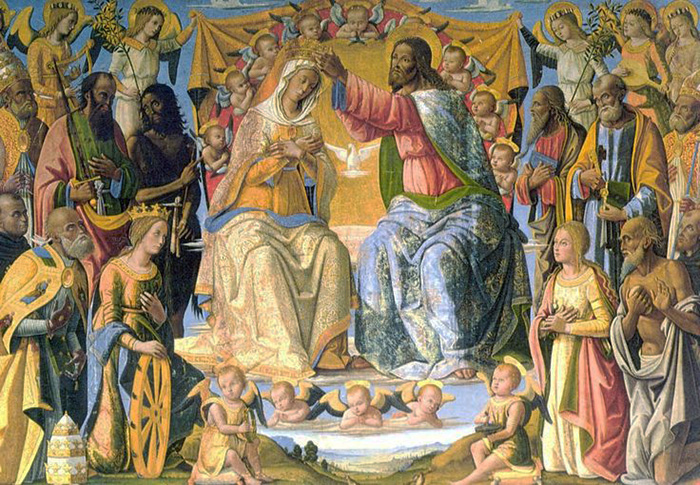 |
Bernardino Fungai, Coronation of the Virgin Altarpiece, Santa Maria dei Servi in Siena
|
It is not known when the Fungai predella panels were dismantled from the altarpiece of the church of Santa Maria dei Servi and then separated. There is a lack of information regarding the dates when these panels found their way into the museums where they are housed at the present. [5]
Paintings
"Madonna del Bordone" by Coppo di Marcovaldo (1261 CE).
Madonna del Marcovaldo (called Madonna del Bordone) by Coppo di Marcovaldo, signed and dated 1261, in Byzantine style and partially repainted by a pupil of Duccio. Its height of 7 feet 3 inches and its width of 4 feet foreshadow the late-thirteenth-century tendency for panel paintings to approach the scale of frescoes.[6]
The Massacre of the Innocents by Matteo di Giovanni (1491)
It is the last of four works created by Matteo di Giovanni on the theme of the Slaughter of the Innocents. The painting was commissioned by the Spannocchi merchant family in 1491 and was intended from the start for the chapel dedicated to the Slaughter of the Innocents.
Two other versions are in Santa Caterina a Formello in Naples and Sant'Agostino, also in Siena. He also made a marble pavement panel of the same subject in the Duomo.
Adoration of the Shepherds (1404) by Taddeo di Bartolo
Madonna and Saints by Matteo di Giovanni
Madonna with child by Duccio di Buoninsegna
The Slaughter of the Innocents by Pietro Lorenzetti
Madonna del Popolo by Lippo Memmi
Herod’s Feast by Pietro Lorenzetti
The Death of St. John the Evangelist by Pietro Lorenzetti
Annunciation by Francesco Vanni
The Madonna of Belvedere of Jacopo di Mino del Pellicciaio and Taddeo di Bartolo (1363)
|
|
|
| |
|

|
|
|
|
|
 |
|
 |
|
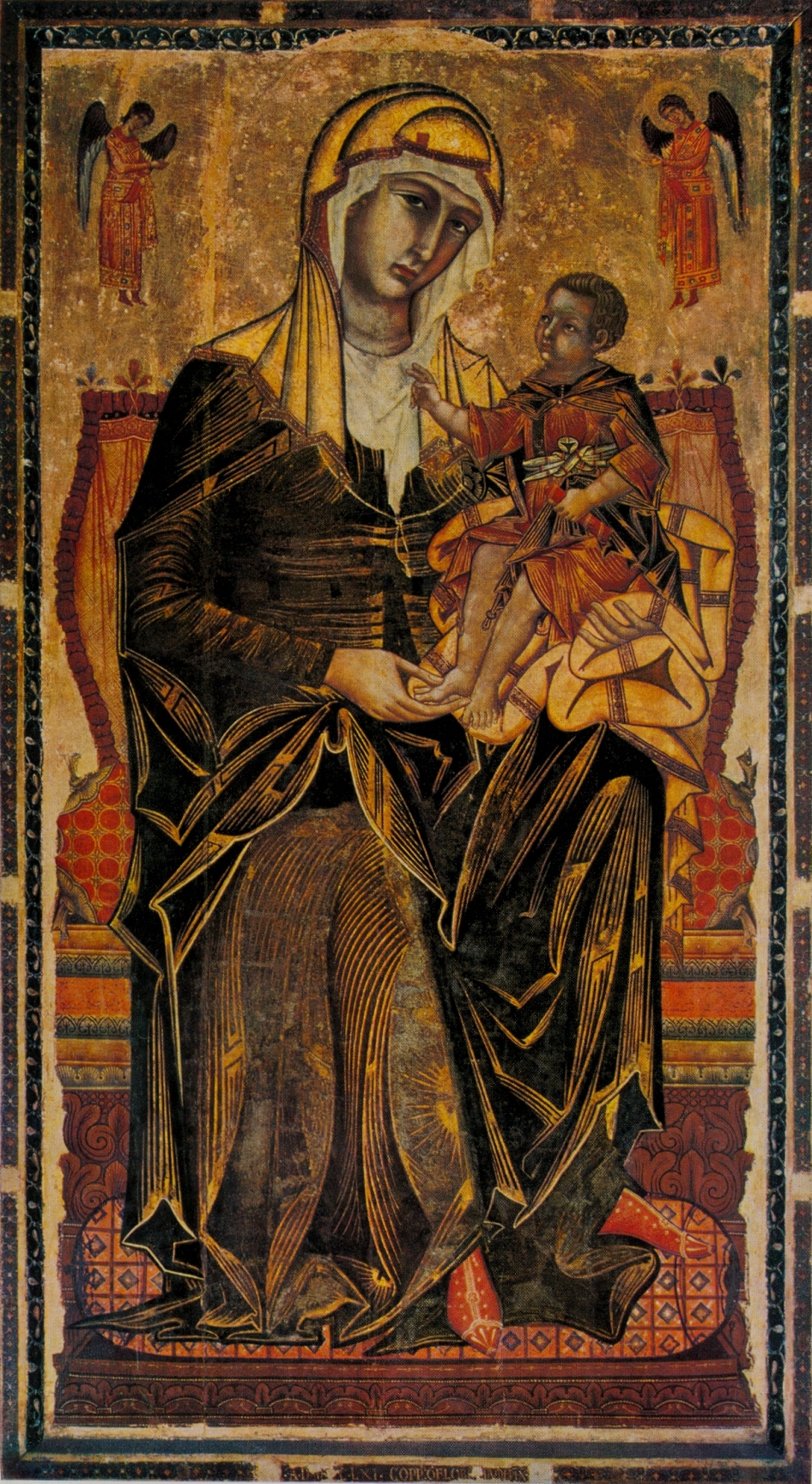
|
| San Clemente in Santa Maria dei Servi, Siena |
|
Facciata della basilica di San Clemente in Santa Maria dei Servi, Siena
|
|
Coppo di Marcovaldo, Madonna del Bordone, Siena, Chiesa dei Servi, 1261 [3]
|

|
|
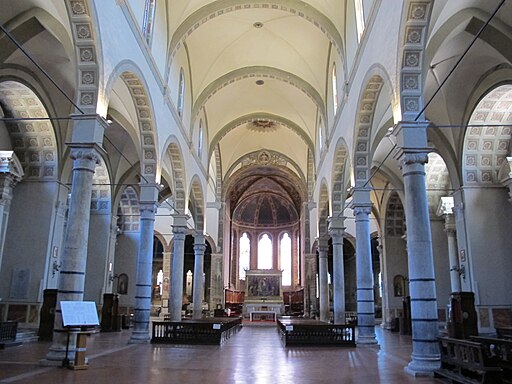 |
|
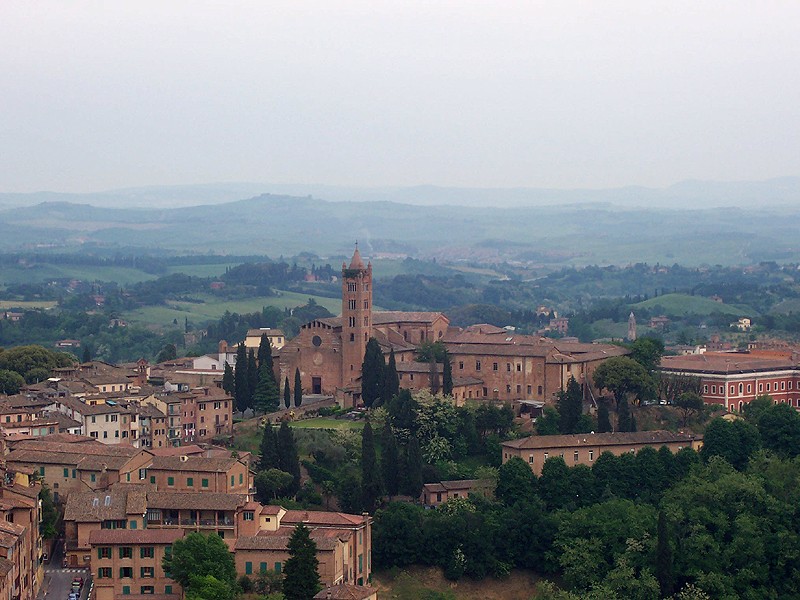 |
Pietro Lorenzetti, Francesco e Niccolò di Segna, 1330-1340 circa, affresco, Basilica dei Servi, Siena
|
|
|
|
|
 |
|
|
|
|
Matteo di Giovanni, Strage degli Innocenti, 1491, basilica di San Clemente in Santa Maria dei Servi
|
|
|
|
|
Urban trekking in Siena | Porta Romana - Piazza del Campo circular walk
Porta Romana - Orto de’Pecci - Piazza del Mercato - Torre del Mangia - Piazza del Campo - Cappella di Piazza - Palazzo Pubblicco - Palazzo Piccolomini, Banchi di Sotto - Archivio di Stato - San Martino and the Logge del Papa- Basilica di San Clemente in Santa Maria dei Servi - Porta Romana
|

|
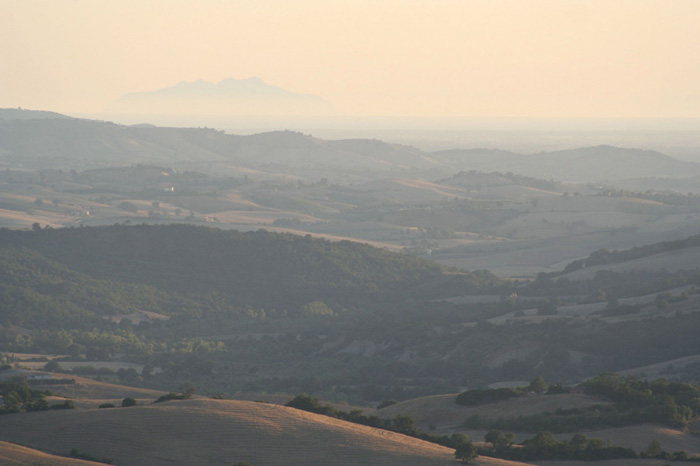 |
Podere Santa Pia, un incantevolecasa vacanze nel cuore della Maremma meridionale, con suggestiva veduta verso il Monte Amiata, la penisola di Monte Argentario e Montecristo e la Corsica immerse nel blu intenso del Mar Tirreno.
|
Bibliography
Charboneau, Damian M.; Montagna, Davide M. (1989). "The Fungai altarpiece in Santa Maria dei Servi in Siena (1498-1501): rare exhibit reunites lost predella pieces". Roma. — Journal title=Istituto storico O.S.M.,155:164
White, John (1966). Art and Architecture in Italy 1250 to 1400. Penguin Books.

[1] Foto di LigaDue, licenziato in base ai termini della licenza Creative Commons Attribuzione-Condividi allo stesso modo 4.0 Internazionale
[2] Foto di Sailko, licenziato in base ai termini della licenza Creative Commons Attribuzione-Condividi allo stesso modo 3.0 Unported
[3] Siena: guide with town plan, Santini, Loretta. 1997
[4] The Dead Christ Supported by Two Angels | Art UK Art UK | Discover Artworks The Dead Christ Supported by Two Angels". artuk.org. Retrieved 2017-02-22
[5] The Fungai altarpiece in Santa Maria dei Servi in Siena, 1989
[6] Art and Architecture in Italy 1250 to 1400, 1966
|
| |
#poderesantapia Siena, vista dal Duomo
When you enter the "Gate of heaven”,, you will be able to walk "above" the sacred duomo and enjoy incredible internal and external views… |
|
|
| |
|
|
|
| |
|
|
|
| |
|
|
|
| |
|
|
|
| |
|
|
|
| |
|
|
|
![]()









